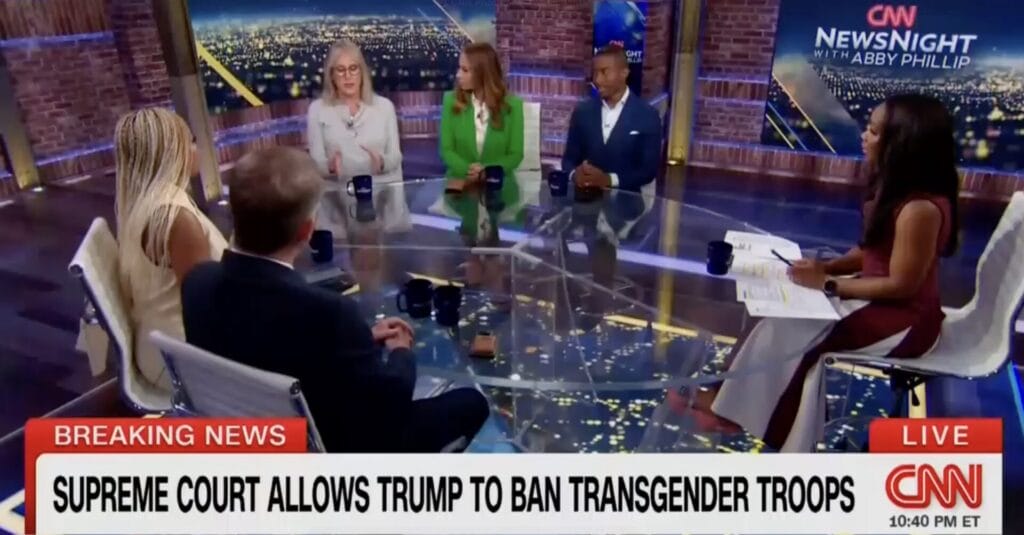CNN NewsNight with Abby Phillip welcomed a transgender military veteran to deploy facts after a Supreme Court order allowed a ban on trans service to be enforced. The move overruled two lower courts that ruled the ban is likely unconstitutional.
The Court gave no reason for its decision, and the Trump administration has not produced evidence showing a need for the ban.
“All of the courts that have looked at this issue and said there is nothing, in fact, to back up what the government is claiming here,” former U.S. Naval intelligence officer Alaina Kupec told CNN. “In fact, the judge has challenged them to produce evidence, and they couldn’t produce any evidence. So I think it’s a really dark day for our country where basically we’re allowed to discriminate against a class of people.”
Law Dork’s Chris Geidner reported the litigation against the ban could take a year or longer, but that the Court’s order means that transgender personnel could be forced from their jobs immediately. Kupec, who served four years in the Navy overseeing air operations over Bosnia, Iraq, Iran, and Yemen, said that puts national security at risk.
“They wake up tomorrow without a job, having been removed from their commands,” Kupec said.
“Operational readiness will be impacted. There’s commands that are going to be left without leaders. There’s going to be real life implications for theaters around the world where our military is protecting this country. And for what end?”
CNN’s conservative commentators attempted to claim President Trump’s opinion matters most in deciding who can serve. They could offer no rationale to explain why opinion not supported by fact would matter more than the Constitution’s guaranteed protections.
“You’ve made the argument twice that the commander in chief’s opinion is all that matters. You’ve said that twice now,” Kupec said. “So if he wakes up tomorrow and says it’s not okay to be gay or lesbian and serve because that’s his opinion, there’s nothing to back that up. They meet the physical standards. They meet the intellectual standards. They have voluntarily decided to serve their country, to give their life for this country so many of us don’t have to, that it’s the opinion without any basis in fact that that’s what matters more than the Constitution of equal rights and equal protection.”
Host Abby Phillip noted that the military has twice in history had to reform to accept service members from diverse backgrounds, including integrating Black service members, and dropping the “Don’t Ask, Don’t Tell” policy used to oust LGBTQ service members. She pressed the panel to explain how discriminating against transgender people was any different.
“The definition of discrimination, according to the American Psychological Association, discrimination is the unfair or prejudicial treatment of people or groups based on characteristics such as race, gender, age, or sexual orientation,” Philip said.
“What is the difference between prohibiting certain groups like transgender people from serving, vs, people based on their race or gender?”
“I personally feel there is a difference,” commentator Shermichael Singleton said. “And I’m just going to leave it at that.”
Kupec, Founder and President of the nonprofit Gender Research Advisory Council + Education (GRACE), explained the bottom line.
“There’s never been a military standard that transgender people have not met,” Kupec said.
“Military standards have not been lowered for people who are transgender. And I think that’s that’s the issue here and the courts that have looked at this issue in depth have said this is pure animus, that there is no evidence for this… and all the courts say the same thing. That’s the travesty here.”
A federal judge had ruled the Trump administration failed to provide evidence of a need for a ban, and described the executive order demanding a ban as “soaked in animus.”
“Thousands of transgender servicemembers have sacrificed—some risking their lives—to ensure for others the very equal protection rights the Military Ban seeks to deny them,” Judge Ana Reyes wrote.
A second federal judge, who also ruled to block enforcement of the ban, called the government’s case “unpersuasive.”
“There is no claim and no evidence that [Naval Commander Emily Shilling] is now, or ever was, a detriment to her unit’s cohesion, or to the military’s lethality or readiness, or that she is mentally or physically unable to continue her service,” the judge wrote. “There is no claim and no evidence that Shilling herself is dishonest or selfish, or that she lacks humility or integrity [as baselessly claimed in the Trump order]. Yet absent an injunction, she will be promptly discharged solely because she is transgender.”

“By allowing this discriminatory ban to take effect while our challenge continues, the Court has temporarily sanctioned a policy that has nothing to do with military readiness and everything to do with prejudice,” HRC and Lambda Legal said in a joint statement on Tuesday.
“The Court has upended the lives of thousands of servicemembers without even the decency of explaining why,” said Shannon Minter, Legal Director for the National Center for Lesbian Rights, which filed additional lawsuits on behalf of transgender military members and recruits, Talbott v Trump and Ireland v Hegseth.
“As a result of this decision, reached without benefit of full briefing or argument, brave troops who have dedicated their lives to the service of our country will be targeted and forced into a harsh administrative separation process usually reserved for misconduct,” Minter said.
“I did two tours in Iraq and Afghanistan. 60 combat missions,” Shilling told CNN’s Kaitlan Collins in January. “I went on to be a test pilot, and then the meritorious promotions. I have been at the pinnacle of naval aviation. I think I am proof that we are qualified to serve.”
District Judge Ana Reyes fact checked the Trump orders’ false claims underpinning the military ban.
“This executive order is premised on an assertion that’s not biologically correct,” Reyes said, about the order that falsely claimed there are only “two sexes.”
“There are anywhere near 30 intersex examples. Anyone who doesn’t have XX or XY chromosomes is not just male or female, they’re intersex. If I’m intersex, where am I allowed to go?” Reyes asked.
On the order’s claim about pronouns and military readiness: “Can we agree that the greatest fighting force… is not going to be impacted in any way by less than one percent of the soldiers using a different pronoun than others might want to call them?” Judge Reyes asked.
“It’s frankly ridiculous.”
To date, the Trump administration has not produced anyone to testify under oath about harm resulting from using a service member’s pronouns, or serving alongside a trans service member.













